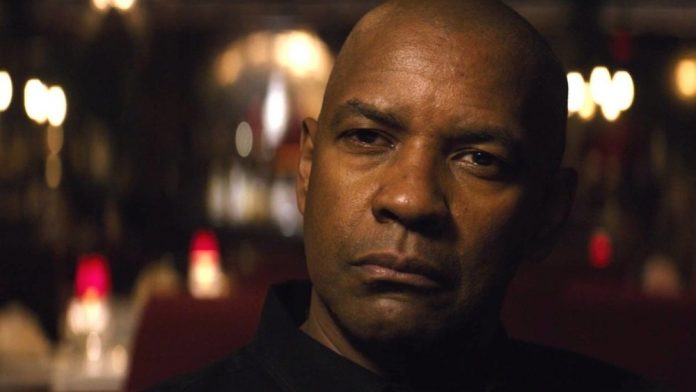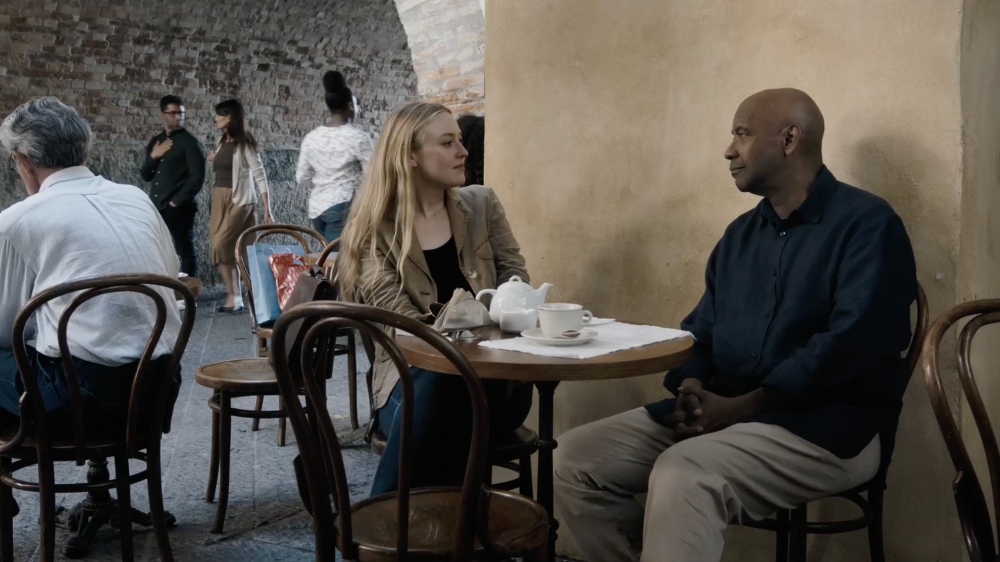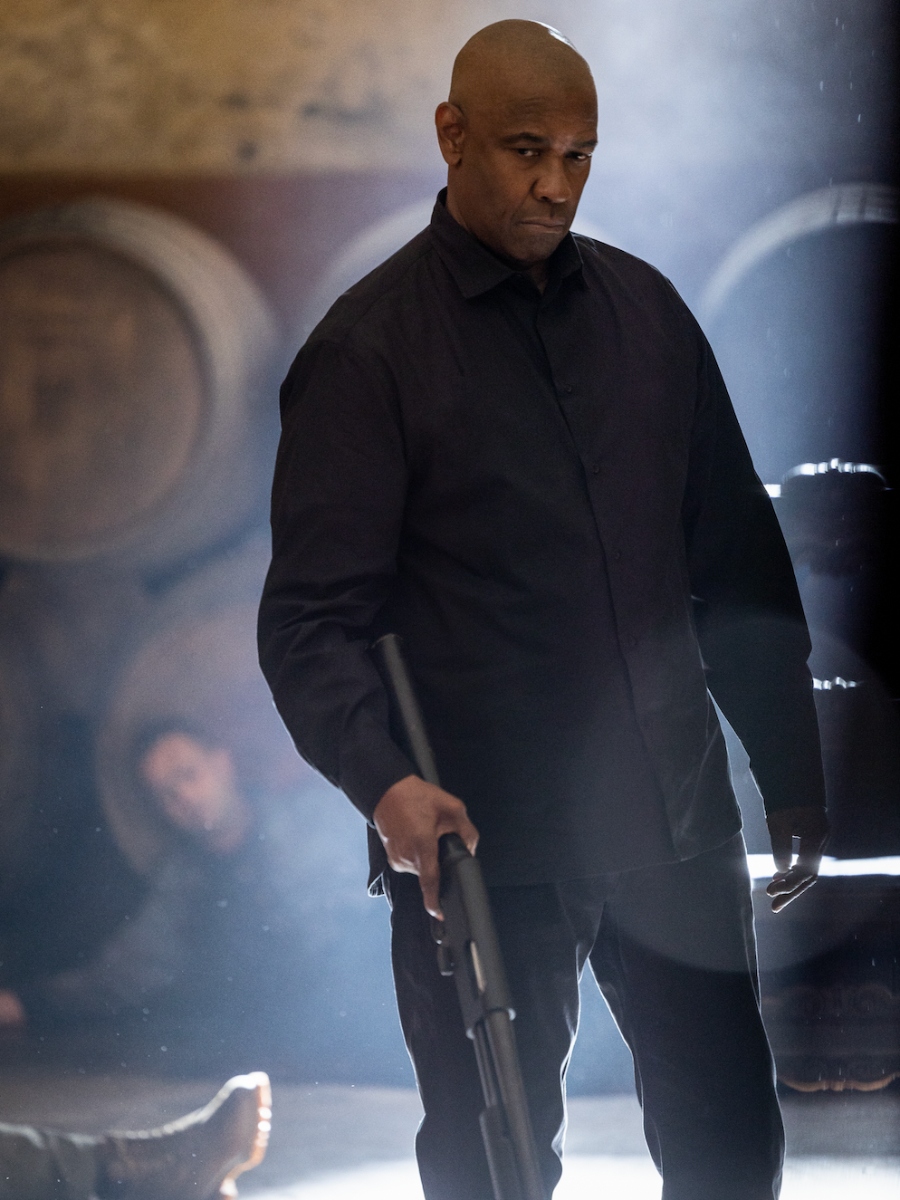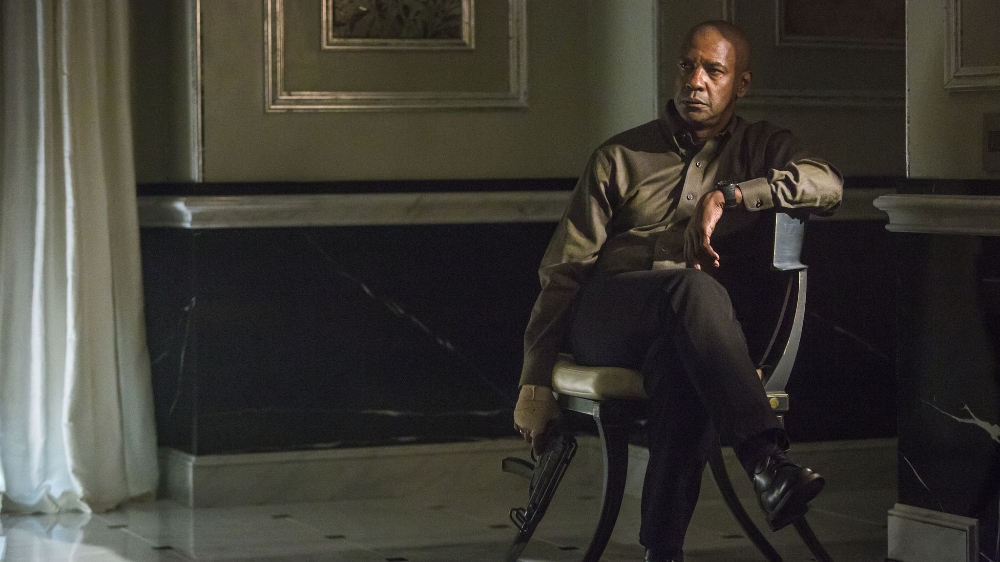The Equalizer 3 Producers and Director Antoine Fuqua on Denzel’s Enduring Stardom, Not Competing With John Wick, and Emancipation‘s Oscar Snub
By Jeff Sneider
August 30, 2023

Until recently, Denzel Washington had an unwritten rule that he didn’t do sequels. Now, however, he’s not only in the midst of filming Ridley Scott’s untitled Gladiator sequel — production was paused due to the SAG-AFTRA strike — but he has delivered the first trilogy of his career with this week’s release of The Equalizer 3, which may just be the action franchise’s best entry yet.
Directed once again by Antoine Fuqua, who also worked with Denzel on Training Day and The Magnificent Seven, this sequel takes Washington’s ex-CIA operative Robert McCall to the modest Italian town of Altomonte just two hours from the Amalfi Coast. He’s enjoying a peaceful retirement and bonding with its longtime residents when it becomes clear that the entire town lives under the threat of violence from the Italian Camorra.
If there’s one thing McCall hates, it’s a bully, and he goes about dismantling their criminal operation with the help of a local policeman and a community full of brave neighbors who care about him as if he were one of their own. McCall is also aided by an intrepid CIA analyst played by Dakota Fanning, who goes way back with Washington, having played his young charge in 2004’s Man on Fire.
Above the Line recently had the chance to have a lively chat with Fuqua and his Equalizer producers Todd Black and Jason Blumenthal of Escape Artists, and the three of them shed some light on the making of the movie while airing out their grievances regarding Emancipation being snubbed across the board by the Academy last year. They also did their best to explain the magical quality that has made Denzel endure as a movie star for the past 35+ years.

Above the Line: We’ve got the producers here, I see, so let’s talk turkey. The first film grossed $192 million and the second film grossed $190 million. Do you think this one could crack $200 million?
Antoine Fuqua: Let me write that down, see if I can get some money coming [to me].
Todd Black: Let me put it this way, Jeff — this is the most bullish, I would say, the three of us have felt on all three films. When you see it with a roomful of 300 people, it just plays like gangbusters. It played better than #1 did. So we’re super excited, and you get to go to Europe, which is even more fun.
ATL: How do you think the character of Robert McCall has evolved over these three films? To me, “Roberto” seemed to take a little more pleasure in inflicting pain in this movie, so I’m curious whether you think he’s getting off on it now.
Fuqua: Well, I mean, that’s the big question, right? When is it too far, and when does divine order step in [so] that you have to slow down and you have to reassess, “Are you doing it for yourself, or are you doing it for others?” So that’s sort of the journey of Robert McCall, right? The first one is about finding his purpose. The second one is him coming to peace with his past, and this one is more about his own internal demons and finding a home.
Black: And trying to move on, and live presently. When he goes to Alta Monte, he really wants to be present and enjoy his life moving forward, and unfortunately, the people [who] he’s enjoying his life with and the place that he’s enjoying [it are] under threat again, and he really didn’t want to do what he’s doing, [but] that’s the conflict inside of him.

ATL: Do you feel pressure to keep up with action movies like John Wick where Keanu Reeves kills 300 people per movie in increasingly elaborate ways?
Black: Not at all.
Fuqua: No. Not at all. Because it’s more personal, and the action is doable.
Black: And we’re not John Wick.
Fuqua: Yeah, Wick is fantastic, and I love what Keanu and those guys do. The ballet of John Wick is beautiful, and Keanu works really hard on gunplay and all that kind of stuff. But this is based on a guy who — it could be you or it could be me, if we had that skillset. There’s nothing in these movies that isn’t doable. So [it’s] much more grounded in that way.
Jason Blumenthal: But we’re also, straight up, making our movie for the audience that also really enjoys the John Wick movies and enjoys the [Jason] Bourne movies, so I think what we’re trying to do is really bridge over, because quite frankly, as great as Keanu is, — and his gun-fu is better than most — we’ve got the GOAT. We literally have the greatest living actor, and that automatically makes our movie a character piece. Not that John Wick isn’t. And believe me, all power to that franchise. But we are truly a character piece and we’ve always been that from Day 1.
Our action is unbelievable because we have Antoine Fuqua, not because we have Denzel Washington. Our character is amazing because we’ve got Denzel. Our action is, we think, unique and really special to our franchise because of what Antoine brings.
Black: And the difference also, say, with John Wick, and some of these other movies is, we have real stories to tell in all three movies. We have human drama, grounded [drama]. There’s nothing in all three of these movies that couldn’t happen in real life. Whereas I think, and with all due respect to John Wick — and god do I wish we had John Wick — I think we’re grounded. Antoine has done an amazing job of grounding our movies, as has our writer, Richard Wenk, and mainly, as does Denzel. He brings a reality to everything he plays in every kind of movie.
Fuqua: Absolutely
Black: So we’re not really John Wick and we’re not really those other movies. We’re kind of our own thing.
Blumenthal: A hybrid.
Black: Which I’m proud of.

ATL: And that’s what I appreciate about this franchise, just so you know, is that McCall feels like a real character and John Wick feels more like a video game avatar. Anyway, tell me about casting Dakota Fanning here and reteaming her with Denzel after Man on Fire. They still have great chemistry all these years later, and I love their banter together, so was that something Denzel pushed for? How did that reunion come about?
Fuqua: Well, I got a call from Todd saying, ‘Hey, Dakota Fanning is interested,’ and I was like, ‘Let’s meet, right now. This afternoon.’
Black: It did happen that way, literally. Antoine was like, ‘Set it up for after lunch.’ Jason and I both got the call from Hanley Baxter, her agent, and [Brittany Kahan], her manager, and Jason and I were like, ‘Wow.’ And we called Antoine before we called anybody, and Antoine was like, ‘I’m in,’ and then once Antoine met her and liked her and said she was right for the role, we then called Denzel — the three of us — and he was like, ‘Oh my God, yes. I love her.’ And then we called the studio, and the studio was like, ‘Oh my God, that’s terrific,’ and that’s how it all happened.
Blumenthal: But I’ll say this, ’cause we didn’t know at the time… we knew she was right for us and what we wanted to do, but I can [say], for the first time that Todd and I have ever made a casting decision, we’ve never seen the fanbase respond [like this]. The idea of bringing them together again created this wave of incoming attention to the project, and we weren’t doing it for that. We thought it would be nice, but people clearly missed that pairing.
Black: Every time we screen the movie for crowds, their favorite scenes are the Denzel-Dakota scenes.
Fuqua: Yeah, they love ‘em.
ATL: Pivoting just a little bit, Antoine, I have to ask, do you feel like Emancipation got a fair shake from Oscar voters last year?
Fuqua: No, I mean, it’s in the past, I don’t wanna get into it, but absolutely not. And it’s not really about me. [It’s about] the people who worked really hard, including Todd, who produced it with me, and it would’ve been nice to see all the hard-working people be acknowledged more, you know?
Black: Can I comment on that? We 100 percent didn’t get a fair shake. I get the Will Smith of it all and I get the Academy feeling that way, I totally understand, but I don’t get [snubbing] our director, who put his entire life into it. I don’t get all the department heads and their teams, I don’t get Ben Foster not getting acknowledged — I mean he was so good, and all the other actors. I don’t get the producers not getting acknowledged. I thought it was a beautiful film. I thought the story was so well told by our writer, I thought Antoine hit it out of the park, and to not get any acknowledgment because of what Will did as an actor? Not right, not fair. That’s my opinion.
Fuqua: No. Correct. 100 percent right. 100 percent.

ATL: Antoine, I know this is your fifth film with Denzel, and Todd and Jason, I know you produced the movies that Denzel has directed, such as Antwone Fisher, The Great Debaters, and Fences, as well as Roman J. Israel and The Taking of Pelham 123, so tell me about the short-hand that the three of you have developed over the years, and what it is about Denzel — both as a movie star and as an actor — that has kept drawing in audiences for the past 35 years?
Fuqua: Well, first, Denzel is an amazing actor. What you know, when you spend your money to go to a movie, is that Denzel Washington is going to deliver a character. Whether you like the whole movie or not, you’re gonna love what he’s gonna do. So that’s the first thing.
The shorthand is, Denzel gives us all a look and we all look at each other and go, ‘Oh, okay, we got it.’ He has a way about him. He’s very precise. We have such a trust, all of us. We know him well.
Black: And we have each other’s backs. He has our back and we have his back.
Fuqua: Yeah, he knows, when he walks on the set, we’ve got it ready. We’re ready to go. There’s no questioning, so that allows him to do what he does, and I think that’s a big part of it.
Black: And the other thing that he’s done for Jason and for myself — we’ve worked with him for… I’ve known him for 31 years, and Jason and I have worked with him for a long time — [is that] I will say that he makes you better at your job because you have to be as good as he is in your job.
So when you look at Training Day or Mag Seven or all the Equalizers, Antoine is there, you know? And I think Jason and I, with all the movies we’ve done with him, I’m really proud of the producing that we’ve done. Because his films have to be produced. He expects A-level work from the top to the bottom, so as producers, he has made me and Jason way better at our jobs. And there is a shorthand. Antoine’s right. And there is a trust.
We’ve worked together so long now, and we can look at him and we know the mood he’s in and we know how to adapt to that mood, and we know when we have to speed up, slow down, listen some more, whatever the things are, we know what that means, and we don’t get thrown by it. A lot of people are intimidated by him, which is understandable. He’s a brilliant guy. He’s like, IQ: genius.
Fuqua: He’s very intense.
Blumenthal: But that’s interesting, like when you say “genius,” because we use that word and we throw it around a lot, and obviously Denzel deserves it, but if you think about it like music, Denzel is like… it’s like Miles Davis. Every one of his band members knew the music, but you didn’t know what Miles was going to do. You had to adapt. Denzel is jazz. You can know all the notes, but he’s not classical music. A classical guy is like a guy who hits, every time, exact, and that’s fine and precise, but the fun for us — and I know it’s not so much fun sometimes for Antoine — but the fun for us is the jazz. It’s the same music, he knows it.
Black: But Antoine has learned how to capture it.
Blumenthal: He conducts it. He’s our conductor. I mean, straight up.
Black: Antoine knows how to capture it while we’re shooting it, and then he knows how to capture it in the cutting room.
Fuqua: Yeah, you have to. You have to.
ATL: I’d be remiss if I didn’t ask for your thoughts on the strike. Any ideas on how to best resolve the strike? And what do you make of the media’s role in all of this? Who are you turning to for strike coverage?
Black: I haven’t thought about the media’s role in it. The media is reporting what it’s reporting so I think the media is fine. I don’t have any issues with the media. I think the biggest issue, honestly, is that the AMPTP, the Writers Guild, and SAG are so in their corners, and what has to happen, truly, is that everyone has to come to the center of the ring right now and they have to take off certain pieces of clothing that they cannot keep wearing because if they keep wearing it, it’s not going to get resolved.
So, some stuff is going to get resolved for the WGA and some stuff is not going to get resolved for the WGA. Some stuff for AMPTP, some stuff not. Some stuff SAG, some stuff not. So, until everyone is willing to be OK with not getting everything they want in these rounds of negotiations — and I do think the Writers Guild is getting there, it feels like, even though [we’ve] had some hiccups and [restarting talks was] not as great as everybody hoped, I think we’re getting there. At least they’re talking! And I do think SAG will follow suit. I just think people are hurting. I mean, everybody’s hurting.
Blumenthal: But could there be a worse time? No. Because audiences are back in theaters. And it’s been so hard to [rebuild] trust to get them back in theaters. And finally, we’re doing this. And Antoine is on a different side, as a guild that’s settled, but Todd and I are in the middle of this. We’re producers. Nobody honks their horn for Todd and I. Nobody is coming and giving us lunch on the side of the road. Because as producers, we need to try and make sure that everyone’s happy. That’s the world of a producer. We want our writers to be happy, we need our studios to be happy. So it’s a very hard time when not everyone’s going to be happy, but that’s how you know you’re coming to a solution, because everybody’s gonna have to give in at this time.
Black: And the AI thing, Jeff, it’s not developed enough for people to make a conclusion, like, this is what we want. Because if you’re one of these guilds, you’re going to leave stuff on the table. So to me, I say you put a pin in it and come back in 12 months, 18 months, 24 months, and keep renegotiating [on that front] and don’t settle on anything now because you’re going to leave stuff on the table for your members. So I think that that’s a foolish thing, but I’m curious, as a journalist, what you think.

ATL: I think we’re running out of time, but in general, this stuff needs to be studied, and yes, the WGA will need to make some concessions, because you can’t get everything you want, that’s not how a negotiation works. But you said Antoine doesn’t have any stake in the game, but he does. You’re an EP on The Terminal List (Prime Video), Mayor of Kingstown (Paramount+), and Legacy (Hulu), all of which are streaming projects, so is it frustrating not knowing how many people are watching or who is watching this stuff? Do they share those viewership stats with you Antoine?
Fuqua: Uh, yes and no, but let me ask you… where [are] you from?
ATL: Boston.
Fuqua: I’m from Pittsburgh. And I won’t say anything else about it, but remember the working-class people. There are a lot of people who live check to check. You have to remember. I’m from Pittsburgh, man. My mom was a maid when I was a kid.
ATL: Sure, I spent the past year as the Editor in Chief of Below the Line and telling those folks’ stories, so I totally get it.
Fuqua: We have to remember them, no matter who’s right or wrong.
Black: We have to remember the people who are cleaning the toilets.
Blumenthal: I don’t think that they’re [i.e. the media] leading with that so much, and that’s really the working class of the movie business, of [the] industry, and [they’re] the people who are really being hurt. You’ll never know their name or see their picture or know what they’ve done, but you know they’ve done something to help all of us and they’re not being taken care of. And that’s just where we are.
ATL: Antoine, you’re a big blockbuster director, so have you ever had any conversations with Marvel, DC, or Lucasfilm about working in those universes, and are you even interested in those gigs? Is there one that appeals to you more than the others?
Fuqua: Yeah, I mean, I had a meeting with a couple guys from Marvel a long time ago. It [was] interesting, but I don’t know what my take would be on that, though. It would be different… [but] it’s interesting, of course.
ATL: What feels like the first Escape Artists project that will go after the strike?
Black: We have a couple coming up. We have a John Madden movie that David O. Russell is directing for us, and then we have another movie at Sony that’s based kind of a graphic novel that Jason is working on right now, a big graphic novel…
Blumenthal: A big mash-up. We’re working on the streaming side. But Todd and I’s day job is to deliver movies. We’ve had a first-look deal at Sony for 27 years, which is, for whatever it’s worth, a feat unto itself. Now that we know audiences want to come back, we want to keep delivering [on] that, so we’re trying desperately to do that.
Black: We’re at a studio where, [thankfully], Tom Rothman likes theatrical movies. We’re lucky to be at Sony and we’re lucky to have a boss who supports what we’re trying to do in a big way.
Blumenthal: I wish you could’ve heard it before you got on, but we were [just on a call where] the producers and directors were singing the praises of the studio, and how well they’re getting our message out there and believe in us and believe in Antoine, especially, and believe in the movie… and when you see that all coming together, and you watch what a movie studio can really do in terms of distribution, globally… this is no longer an international vs. domestic type of business. We are a global business and that’s the point. I think we’ve made a movie that not only plays here but hopefully plays everywhere because that is what we designed.
Black: And we have a chairman, Tom Rothman, who supports this movie and this franchise and he loves our director, and he loves us, and we love him.
ATL: I know that last year, Training Day: Day of the Riot was approved for a state tax credit, so is there any update on the status of that proposed prequel, or perhaps an update on Masters of the Universe from Escape Artists?
Fuqua: Training Day? I’m not doing that. We’re trying to find a director to do it.
Black: [On] Masters, I’m hoping that you guys are gonna hear some great news within the next week.
ATL: Anything you wanted to discuss that I didn’t get a chance to ask you about?
Black: Go see the movie, everybody! Tell everyone how much you liked it. We’re feeling very good about it.
Sony Pictures will release The Equalizer 3 in theaters on Friday, Sept. 1.
